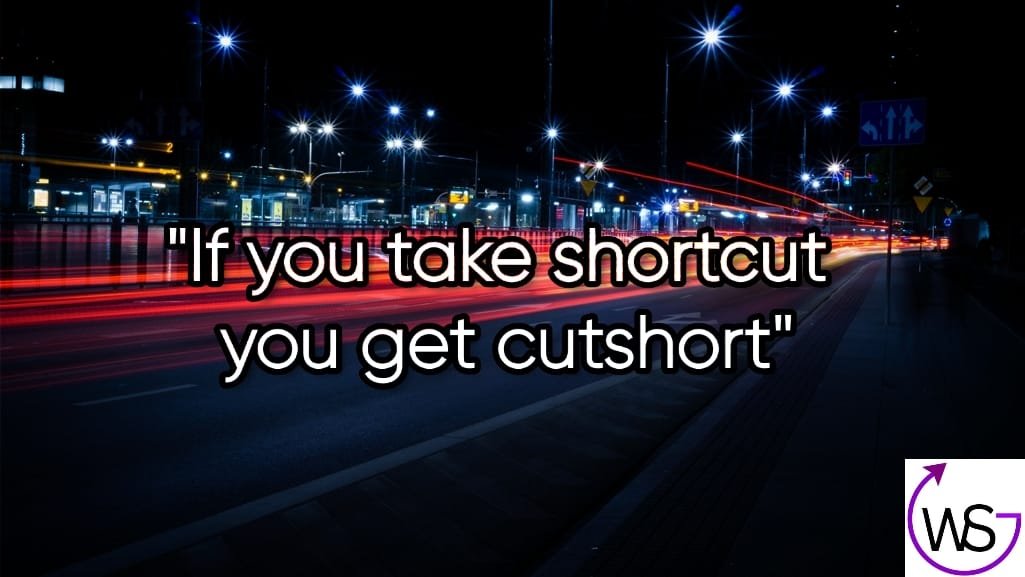
Table of Contents
ToggleIntroduction
The adage “If You Take Shortcut, You Get Cutshort” encapsulates a profound truth about the consequences of opting for quick, seemingly convenient solutions. It serves as a concise cautionary tale, highlighting the potential drawbacks of sidestepping established processes. This saying urges individuals to consider the long-term impact of their choices, emphasizing that the allure of shortcuts may lead to abrupt and undesirable outcomes. In essence, it serves as a succinct reminder that in the journey towards success, taking the scenic route – marked by diligence, patience, and adherence to proper procedures – often proves more rewarding than the tempting detour of shortcuts.
“If You Take Shortcut You Get Cutshort” Expansion in 200 words
The wisdom embedded in the phrase “If You Take Shortcut, You Get Cutshort” speaks to the intricate relationship between effort and outcome. It serves as a cautionary beacon, warning against the allure of quick fixes and expedient paths to success. The saying implies that shortcuts, though tempting in their promise of time-saving, may result in unforeseen complications or limitations in the long run. It encourages a thoughtful examination of choices, advocating for a commitment to thoroughness and adherence to established processes.
This principle extends beyond literal shortcuts, resonating metaphorically in various facets of life. Whether in academic pursuits, professional endeavors, or personal growth, the saying suggests that bypassing essential steps might lead to incomplete achievements or missed opportunities for learning. It becomes a philosophical guide, emphasizing the value of resilience and the recognition that genuine success often emerges from a journey marked by dedication and patience.
In essence, “If You Take Shortcut, You Get Cutshort” prompts individuals to navigate the intricate landscape of their ambitions with a discerning eye. It calls for a balance between the desire for immediate results and the enduring satisfaction derived from a well-earned, unhurried accomplishment. In the tapestry of life, this saying stitches a thread of prudence, urging us to tread carefully and invest in the richness of the journey rather than succumbing to the allure of shortcuts.
“If You Take Shortcut You Get Cutshort” Expansion in simple words
The saying “If You Take Shortcut, You Get Cutshort” is like a friendly guide reminding us to think twice before choosing the quick and easy path in life. Imagine you have a big project or homework, and you see a shortcut – a way to finish it faster. This saying is like a voice saying, “Be careful!” It suggests that while shortcuts might seem helpful at first, they can lead to problems later on.
Picture it like a game. If you try to take a shortcut to reach the finish line quickly, you might find obstacles or miss important things along the way. Similarly, in real life, if we choose the fast way without doing things properly, we might face challenges or miss out on important lessons.
This saying is not just about tasks; it’s also about our journey in learning and growing. Let’s say you’re learning to ride a bike. Taking a shortcut might mean skipping the practice and trying to ride without learning the basics. The saying reminds us that in skipping essential steps, we might “get cutshort” – face difficulties or not reach our goal successfully.
Think about it in school. If you take shortcuts in your studies, like copying someone else’s work instead of doing it yourself, it might seem easier at first. But in the end, you miss out on understanding and learning, and it could affect your grades.
Now, let’s apply it to making friends. If you want to make friends quickly, you might pretend to be someone you’re not. The saying advises against this, suggesting that being true to yourself, even if it takes longer to make friends, is better because it leads to real and lasting connections.
In simple words, the saying teaches us that taking our time, doing things properly, and not rushing through life is important. It encourages patience and reminds us that the satisfaction of reaching our goals is more fulfilling when we take the longer, careful route instead of trying to find shortcuts. It’s like a compass guiding us to navigate life thoughtfully, making choices that lead to long-lasting success and happiness.
“If You Take Shortcut You Get Cutshort” Expansion in 500 words
The saying “If You Take Shortcut, You Get Cutshort” carries a valuable lesson, akin to a wise friend cautioning us about the potential pitfalls of seeking quick and easy solutions in our journey through life. This expression is not merely a cautionary note but a profound insight into the consequences of opting for shortcuts in various aspects of our existence.
Imagine you have a big task, like building a tower with blocks. The shortcut might be trying to stack them quickly without a strong foundation. This saying is like a gentle reminder, urging us to lay a sturdy foundation and stack each block with care. It suggests that shortcuts, while promising a faster route to completion, might compromise the integrity of our efforts.
In the realm of learning, consider the analogy of solving a puzzle. If we take shortcuts, trying to force pieces together without understanding their fit, we might miss the joy of solving it correctly. Similarly, in our educational pursuits, the saying encourages us to embrace the process of understanding, even if it takes a bit longer, rather than opting for quick answers that might not withstand the test of genuine comprehension.
Applying this wisdom to personal relationships, think about making a new friend. Taking shortcuts in friendship might involve pretending to be someone we’re not to fit in quickly. The saying advises against this, suggesting that authentic connections, built on honesty and shared experiences, are more fulfilling in the long run, even if they take time to develop.
Now, consider the saying in the context of time management. If you’re in a rush and choose shortcuts to complete tasks quickly, it might seem efficient initially. However, the saying nudges us to consider the potential repercussions – mistakes, oversights, or incomplete understanding. It underscores the idea that the time saved through shortcuts might lead to setbacks later, thus encouraging a more measured and thoughtful approach to time utilization.
In the professional realm, the saying becomes a guiding principle for individuals striving for success. It prompts a reflection on the temptation to take shortcuts for quick achievements and highlights the potential risks associated with such hasty decisions. It advocates for a diligent and comprehensive journey toward professional goals, emphasizing that sustained effort and dedication often yield more robust and lasting results.
Furthermore, let’s explore the saying in the context of personal growth and development. If we attempt to take shortcuts in acquiring new skills or building character, we might miss out on the valuable lessons that come with patient, gradual progress. It encourages us to appreciate the journey of self-improvement, understanding that the process itself contributes significantly to our growth and resilience.
In essence, “If You Take Shortcut, You Get Cutshort” serves as a multifaceted guide for navigating the complexities of life. It nudges us away from the allure of quick fixes and encourages a mindset that values the journey as much as the destination. The saying invites us to be intentional in our actions, patient in our pursuits, and mindful of the potential consequences of choosing shortcuts. As we navigate the intricate tapestry of our lives, let this wisdom be a steady companion, guiding us toward the richness that comes from a thoughtful and deliberate journey.
“If You Take Shortcut You Get Cutshort” Expansion in 1000 words
The timeless wisdom encapsulated in the saying “If You Take Shortcut, You Get Cutshort” invites us on a contemplative journey, urging us to unravel the intricate layers of meaning embedded in this succinct phrase. At its core, this expression serves as a compass, guiding us through the delicate balance between expediency and the enduring rewards of patience, diligence, and the thorough pursuit of our goals.
Consider a scenario where you have a challenging task ahead – let’s say, constructing a sturdy bridge out of building blocks. The shortcut might be attempting to stack the blocks quickly without laying a proper foundation. The saying is akin to a wise advisor cautioning against the hasty approach, emphasizing that a solid foundation and careful stacking will contribute to the lasting integrity of the bridge.
Now, extend this analogy to the realm of education. Think of learning as a puzzle, with each piece representing a nugget of knowledge. Taking shortcuts in understanding might involve attempting to force the pieces together without comprehending their fit. The saying gently guides us towards a more patient approach, advocating for the joy that comes from solving the puzzle correctly and understanding each piece in its rightful place.
In the context of relationships, envision the process of making a new friend. Taking shortcuts in forming connections could involve pretending to be someone we’re not, a quick fix to fit in swiftly. The saying, acting as a relational compass, advises against this approach. It suggests that authentic connections, built on honesty and genuine experiences, are more rewarding in the long run, even if they require time and patience to develop.
As we traverse the landscape of time management, the saying echoes with significance. In a fast-paced world where efficiency is often prioritized, the temptation to take shortcuts in completing tasks quickly is ever-present. The saying, acting as a reminder, prompts us to consider the potential repercussions of such hasty decisions – errors, oversights, or an incomplete understanding of the task at hand. It underscores the idea that the time saved through shortcuts might lead to setbacks later, encouraging a more measured and thoughtful approach to managing our time.
Extend this wisdom to the professional domain. The saying becomes a guiding principle for those striving for success in their careers. It prompts a reflection on the allure of shortcuts in the pursuit of quick achievements and shines a light on the potential risks associated with such hasty decisions. It advocates for a diligent and comprehensive journey toward professional goals, emphasizing that sustained effort and dedication often yield more robust and lasting results.
Moreover, let’s unravel the saying in the context of personal growth and development. If we attempt to take shortcuts in acquiring new skills or building character, we might miss out on the valuable lessons that come with patient, gradual progress. The saying becomes a gentle mentor, encouraging us to appreciate the journey of self-improvement, understanding that the process itself contributes significantly to our growth and resilience.
In essence, “If You Take Shortcut, You Get Cutshort” serves as a multifaceted guide for navigating the complexities of life. It nudges us away from the allure of quick fixes and encourages a mindset that values the journey as much as the destination. The saying invites us to be intentional in our actions, patient in our pursuits, and mindful of the potential consequences of choosing shortcuts.
In the intricate tapestry of our lives, let this wisdom be a steady companion, guiding us toward the richness that comes from a thoughtful and deliberate journey. As we navigate the complexities of tasks, relationships, time management, and personal growth, let us heed the counsel embedded in this saying, allowing it to shape our choices and lead us towards the enduring rewards that await those who embrace the path of thoroughness and patience.

